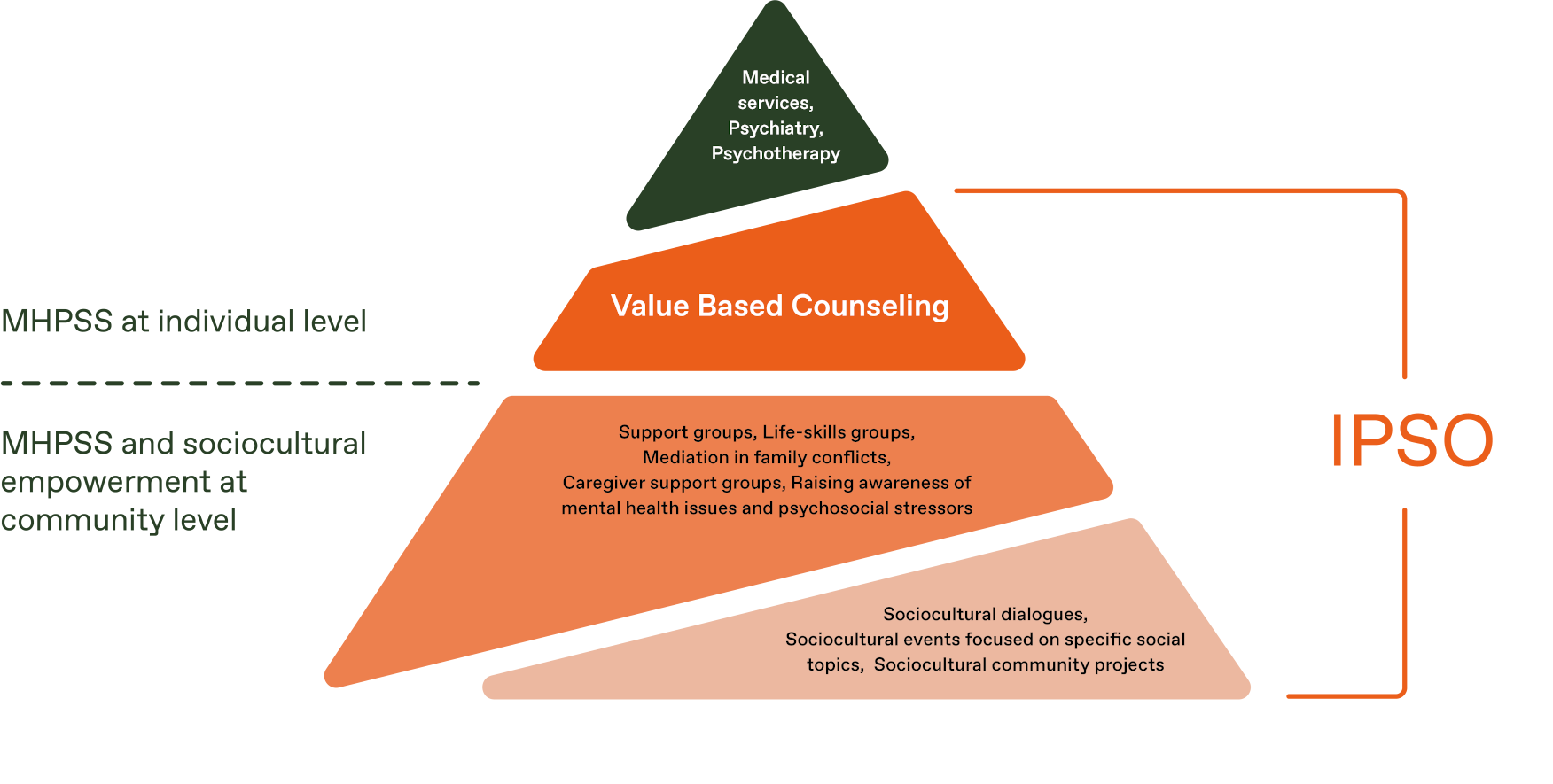About us
Who we are
We are a non-profit humanitarian organisation specialising in MHPSS (Mental Health and Psychosocial Support). We see our task as encouraging people and communities burdened with experiences of flight, migration or violence so that they can regain their agency. For this purpose, we have developed a short-term intervention – Value Based Counseling (VBC) – which has been tried and tested in many different contexts and subsequently evaluated. VBC is culturally sensitive and intracultural and therefore suitably scalable. It is suitable for use in resource-poor settings in conflict and crisis areas as well as in activity areas whose health and social systems are overloaded.
In keeping with the sustainability strategy of our humanitarian work, we are also committed to developing effective medium- and long-term structures and skills that will really improve mental health in conflict, crisis and disaster areas and develop context-, situation- and needs-based solutions.
We are convinced that internal peace must always be promoted when re-establishing and strengthening civil society. Help us to create a world where everyone’s well-being matters, where resilience thrives and a better future for vulnerable people comes within reach.

Our values and our stance

We regard all human beings as being “born equal and free with regard to dignity and rights” and that human dignity as well as human rights are “inviolable”, regardless of cultural, ethnic, and social backgrounds, nationality, religious affiliation and beliefs, age, gender, sexual orientation, skills, and much more.
We are oriented by the humanitarian principles of humanity, independence, impartiality, and neutrality: alleviating human suffering is the guiding principle of our actions.
We consider freedom, freedom of thought and freedom of expression to be fundamental to our work. We are committed to the right to health and that also means the right to mental health.
We are committed to the right to cultural self-determination. We operate with respect for local beliefs, culture and values and treat them all with esteem. We promote empathy and mutual understanding and combine them with our professionalism.
Ipso’s MHPSS Pyramid

Our “Value Based Counseling” method
Timeline
Our Locations
IPSO Care Center Berlin
Hohenstaufenstr. 31
10779 Berlin
+49 (0)30 55077203
Contact persons:
Paul Dunkel
E-Mail: p.dunkel@ipsocontext.org
Maryam Gardisi
E-Mail: m.gardisi@ipsocontext.org
IPSO Care Center Thuringia
Schillerstraße 26
99096 Erfurt
Contact person:
Susette Schubert
Phone: +49 (0)361 3468909
E-Mail: s.schubert@ipsocontext.org
IPSO Care in the Falkenried Clinics in Hamburg
Psychosomatics, psychiatry and psychotherapy
Falkenried 7
20251 Hamburg
Contact persons:
Alia Zein (Arabic, English)
E-Mail: a.zein@ipsocare.org
Phone: +49 (0)178 1692417
Nahid Mehran (Dari, Farsi, German)
E-Mail: n.mehran@ipsocare.org
Phone: +49 (0)177 8534127
Head Office
IPSO gGmbH
Münsterplatz 13
DE-78462 Konstanz
+49 (0)7531 2820231
info@ipsocontext.org
Office Berlin
IPSO gGmbH
Geisbergstr. 28
DE-10777 Berlin
+49 (0)30 21945830
info@ipsocontext.org
Our Team
Management, Administration, Central Tasks
| Inge Mißmahl-Grusche | Founder and Managing Director |
| Maryam Gardisi | Managing Director |
| Dr. Birte Brugmann | VBC & Advisor to the Board of Management |
| Marcus Paul | Head Administration and Finance |
| Khatol Sediq | Finance Manager |
| Thomas Brüggemann | Finance Consultant |
| Ina Rossmann | Human Resources Management |
| Alba Antolín Blanco | Human Resources Management |
| Dr. Andrea Bärnreuther | Project and Organisation Development |
| Andreas Borutta | IT Product Developer |
| Sven Perbandt | IT Developer |
| Nabeel Sultan | IT Developer |
IPSO Care
| Susette Schubert | Project Management |
| Matthias Freund | VBC Counselor / Project Management |
| Hussein Alalo | VBC Counselor / Project Management |
| Paul Dunkel | VBC Counselor / Project Management |
| Dr. Tahereh Orang | VBC Counselor / Project Management |
| Zuka Abo Saadi | VBC Counselor |
| Dr. Emaldaldin Ahmadi Sartakhti | VBC Counselor |
| Almafaalani Abed Alnaser | VBC Counselor / Training |
| Ahmad Alseijari | VBC Counselor / Training / Supervision |
| Mohammed Reza Amiriam | VBC Counselor |
| Pedro Carapeto | VBC Counselor |
| Ahmad Chahabi | VBC Counselor / Supervision |
| Ksenia Dagis | VBC Counselor |
| Anna Demianova | VBC Counselor |
| Sifana Elrifaei | VBC Counselor / Supervision |
| Wafa Gazawi | VBC Counselor |
| Dawit Ghebretsadik | VBC Counselor |
| Thalil Olad Hassan | VBC Counselor |
| Atal Hewad | VBC Counselor Quality Management IPSO International |
| Frishta Hewad | VBC Counselor |
| Dr. Fatemeh Sadat Hosseini | VBC Counselor / Supervision |
| Serhii Hryshkan | VBC Counselor |
| Olga Kalgina | VBC Counselor |
| Maria Karagicheva | VBC Counselor |
| Chavin Khalil | VBC Counselor |
| Elena Korchagina | VBC Counselor |
| Olena Lysenko | VBC Counselor |
| Nahid Mehran | VBC Counselor / Supervision |
| Maryna Molchan | VBC Counselor |
| Vira Mysak | VBC Counselor |
| Yuliia Rudakova | VBC Counselor |
| Masoud Sardabi | VBC Counselor / Supervision |
| Aous Shaheen | VBC Counselor / Supervision |
| Yukta Singh | VBC Counselor / Project Management |
| Dr. Jacky Talonto | VBC Counselor |
| Oskana Verkhovod | VBC Counselor |
| Iryna Vseliubska | VBC Counselor |
| Alia Zein | VBC Counselor / Project Management / Training / Supervision |
| Shainaz buggle | VBC Counselor |
IPSO Academy, Evaluation & Quality Management
| Inge Mißmahl-Grusche | Training, Quality assurance of all services |
| Pelle Bernhold | Evaluation/Studies |
| Georgia Koutsouradi | VBC Counselor / Project Management |
| Lothar Dunkel | VBC Counselor / Training / Supervision |
| Dr. Isabelle Azoulay | VBC Counselor / Training / Supervision |
| Rike Wiens | VBC Counselor /Project Management / Training / Supervision |
| Anna Krap | Project Manager |
| Wim Piels | Project Manager |
| Stefano Marcucci | VBC Counselor / Project Management / Training / Supervision |
